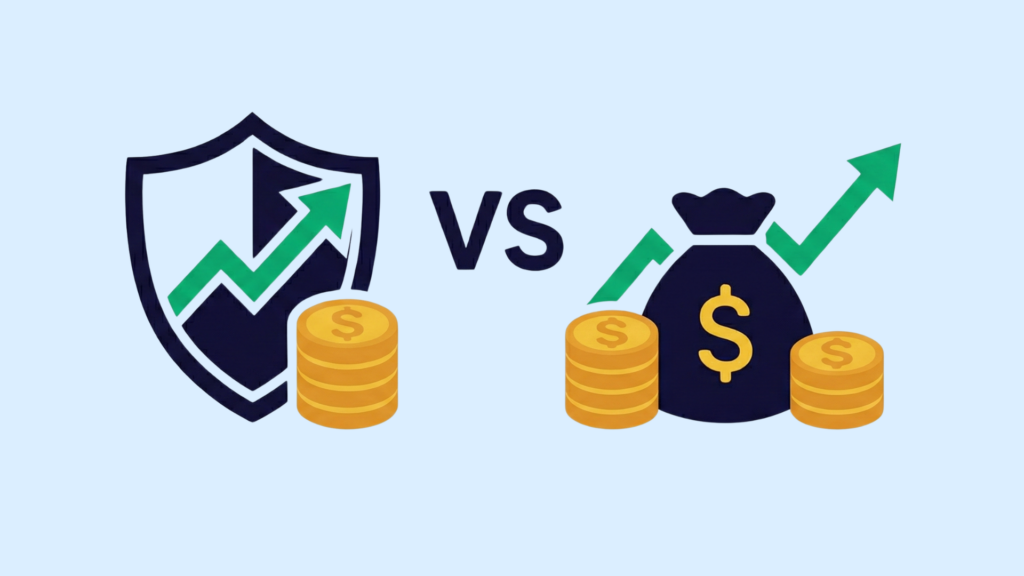Quick Summary
Direct Mutual Funds are purchased directly from the AMC, with lower expense ratios, higher NAVs, and improved long-term returns, but with DIY investment management. Suitable for able, self-reliant investors.
Regular Mutual Funds have intermediaries like brokers or advisors who provide expert advice, constant portfolio assistance, and ease of investment, but with higher charges and reduced returns due to commission.
Key Differences:
Cost: Direct funds have lower expense ratios.
Returns: Direct funds generally give higher net returns.
NAV: Direct plans usually have a higher NAV.
Support: Regular plans offer financial advisory services.
Ease: Regular plans are easier to manage for beginners.
You can move from regular to direct plans—just remember to consider exit loads and tax implications.
What are Direct Mutual Funds?
Direct mutual funds offer a straightforward way to invest, allowing you to bypass intermediaries and invest directly through the Asset Management Company (AMC). This direct approach reduces costs and often leads to better returns. Understanding how direct mutual funds work can help you make more informed investment decisions.
Definition of Direct Mutual Funds
Direct mutual funds are investment schemes offered directly by the AMC without involving intermediaries like brokers or distributors. By purchasing these funds directly, you avoid paying commissions or distribution fees, resulting in a lower expense ratio—the fee charged by the fund to manage your investment.
Cost Structure of Direct Mutual Funds
Since there are no intermediaries involved, you don’t pay any commissions, which significantly reduces the expense ratio. Lower expenses mean a greater portion of your investment goes towards growth, enhancing your potential returns over time.
How to Invest in Direct Mutual Funds:
Investing in direct mutual funds is simple and accessible. Here’s how you can do it:
- Online Investment: Visit AMC’s official website and select the direct plan of your choice. Register yourself, complete the KYC (Know Your Customer) process, and start investing.
- In-Person: You can also invest by visiting the AMC or its registrar’s office. Fill out the necessary forms and submit your KYC documents to start your investment journey.
- Through SEBI Registered Investment Advisors (RIAs): While RIAs charge a fee, they can provide expert tips and help you choose the right direct mutual funds based on your financial goals.
What are Regular Mutual Funds?
Regular mutual funds are popular for investors who prefer a more guided approach. Intermediaries like brokers or financial advisors can provide expert advice, assistance, and ongoing support. However, this convenience comes at a cost reflected in the fund’s expense ratio.
Definition of Regular Mutual Funds
Regular mutual funds are investment schemes that you purchase through intermediaries such as brokers, financial advisors, or distributors. These intermediaries provide valuable services like investment advice, portfolio evaluation, and transaction assistance. However, these services come at a cost, as the fund house pays the intermediary a commission or distribution fee.
Cost Structure of Regular Mutual Funds
The cost structure of regular mutual funds includes the commissions paid to intermediaries, which are built into the expense ratio. This fee is higher than direct mutual funds because it covers the compensation for services provided by brokers or financial advisors.
Advantages of Regular Mutual Funds
Regular mutual funds offer several advantages, especially if you prefer a hands-on approach to investing with expert assistance:
- Access to Financial Advisors: You receive personalised investment advice and guidance, helping you make better investment decisions.
- Simplified Investment Process: Intermediaries handle the paperwork, KYC (Know Your Customer) process, and other administrative tasks, making the investment process smoother and more convenient.
- Ongoing Support: Financial advisors or distributors provide continuous support, including portfolio reviews, account statements, and assistance with redemption requests.
Key Differences Between Direct and Regular Mutual Funds
Understanding the differences between direct and regular mutual funds can help you make the best choice that aligns with your investment goals. So, let’s get right into it.
Expense Ratios
Direct mutual funds do not have intermediaries, so the expense ratio is lower. For example, a direct fund might have an expense ratio of 0.5%, meaning only 0.5% of your investment is used to cover management costs.
On the other hand, regular mutual funds include intermediary commissions, often leading to a higher expense ratio, such as 1%. This means that a part of your investment goes towards covering fees, which can slightly reduce your overall returns.
NAV Differences
Net Asset Value (NAV) represents the per-unit market value of a mutual fund’s assets.
Since direct funds have lower expense ratios, their NAV tends to be higher than that of regular funds. This is because more of your money is invested and working for you rather than being used to pay commissions.
In contrast, regular mutual funds have a lower NAV due to higher expenses, which slightly diminishes the growth potential of your investment.
Returns
Direct mutual funds generally offer higher returns because they have lower costs. For instance, if direct and regular funds yield a 12.5% market return, the direct fund might net you a 12% return after expenses.
Whereas the regular fund might only provide an 11% return due to higher costs. Over time, this difference can lead to a more significant accumulation of wealth in direct funds.
Investment Process
Direct mutual funds let you invest directly through the AMC, giving you full control but requiring a bit more financial knowledge and effort. In contrast, regular mutual funds involve an intermediary— a broker or financial advisor—who handles much of the process for you. This makes regular funds more convenient for those who prefer guided assistance, especially if you are less familiar with mutual funds.
Advisory and Support
Financial advisors or distributors assist with the investment process and provide ongoing support, such as portfolio reviews and redemption assistance. This guidance can be valuable if you prefer personalised advice and don’t have the time or expertise to manage your investments independently. Direct mutual funds, on the other hand, require you to take a more active role in managing your investments, as no advisory support is included.
Pros and Cons of Direct Mutual Funds
Direct mutual funds offer specific advantages and disadvantages that cater to different types of investors. Here’s a more detailed look at their pros and cons:
Pros of Direct Mutual Funds
- Lower Expense Ratios mean a smaller portion of your investment goes toward fees, allowing more of your money to be invested in the market.
- Higher NAV: Direct funds do not have distribution commissions, which leads to a higher NAV, meaning your investment units are worth more than regular funds.
- Higher Returns: Since they have a lower expense ratio, direct mutual funds generally yield slightly higher returns than regular mutual funds.
Cons of Direct Mutual Funds
- Lack of Advisory Support: Investors are responsible for selecting and managing their investments without the guidance of a financial advisor.
- Complex Decision-Making: The absence of professional advice can make choosing and managing investments challenging.
- Investor Bias: Without guidance, investors may develop biases, such as favouring certain types of funds, which can lead to poor diversification.
Pros and Cons of Regular Mutual Funds
Regular mutual funds offer several benefits while having higher costs, especially for investors who value professional guidance. Here’s an brief overview of their pros and cons:
Pros of Regular Mutual Funds
- Access to Professional Advice: Financial advisors or distributors help you choose the right funds based on your goals, risk tolerance, and financial situation.
- Ease of Investment: Intermediaries handle much of the paperwork and decision-making, making it easier for investors who may not be well-versed in financial matters.
- Regular Monitoring and Reviews: Intermediaries also provide ongoing portfolio management services, helping to regularly rebalance and optimise your investments.
- Value-Added Services: In addition to investment advice, intermediaries offer additional services such as tracking investments, generating account statements, and assisting with redemption requests.
Cons of Regular Mutual Funds
- Higher Expense Ratios: The inclusion of intermediary commissions in the expense ratio means that regular mutual funds have higher costs, which can reduce returns over time.
- Lower NAV: Due to the higher expense ratios, the NAV of regular mutual funds is generally lower than that of direct funds, meaning your investment units are worth slightly less.
- Lower Returns: The higher costs associated with regular mutual funds typically result in lower net returns for investors compared to direct funds.
Which One Should You Choose?
Both direct and regular mutual funds are good investment choices, but the choice between the two depends on multiple factors such as:
Investor Profile
If you can research and manage your investments independently, direct mutual funds may be ideal, offering higher returns with lower expenses. However, if you prefer guidance and support, particularly if you are new to investing, regular mutual funds provide professional advice and ongoing portfolio management.
Cost Considerations
Direct funds come with lower expense ratios, allowing you to retain more of your returns. On the other hand, regular funds include a nominal fee for professional advice and convenience, which can be valuable if you lack the time or expertise to manage your investments independently.
Long-Term Goals
If maximising returns over the long term is your primary goal and you are comfortable making independent investment decisions, direct mutual funds are likely the better option. However, if your long-term strategy includes seeking expert guidance to optimise your portfolio based on changing market conditions, regular mutual funds could be more suitable, even with their higher costs.
How to Switch from Regular to Direct Plans
If you’ve decided to switch from a regular mutual fund to a direct plan, knowing how to do it smoothly is essential. The process is straightforward, but there are some crucial factors to keep in mind, including taxes and costs. Here’s a clear guide to help you switch without hassle.
Process of Switching
Switching from a regular to a direct mutual fund plan can be done either online or offline. If you prefer online,
- Log in to your mutual fund account through the AMC’s website or platforms like CAMS or KARVY.
- Navigate to the transaction section, select the ‘Switch’ option, choose your fund, and select the ‘Direct Plan’ option.
- Follow the on-screen instructions, and your switch will typically reflect within four working days.
For offline switching,
- Visit your mutual fund’s nearest branch and fill out a switch form. You’ll need to provide details like your folio number and the fund name.
- Submit the form, and once processed, you’ll receive an updated account statement.
- You can also ask your intermediary to handle the switch for you.
Tax Implications
Switching from a regular to a direct plan is treated as a redemption and a fresh investment for tax purposes. This means capital gains tax will apply. If you switch equity funds within one year, short-term capital gains tax (15%) applies.
For switches after one year, long-term capital gains tax (10%) is applicable if your gains exceed ₹1 lakh. For debt funds, short-term gains are taxed as per your income tax slab if held for less than three years, and long-term gains are taxed at 20% with indexation benefits (adjusting the cost of purchase for inflation).
Costs Involved in Switching
Before switching, check if your current mutual fund plan has an exit load—a fee charged when you exit or redeem your units. Exit loads typically apply if you redeem your investment before a specific period, reducing its value.
The Bottom Line
Direct mutual funds offer lower expense ratios, resulting in higher returns over time, but require a more hands-on approach. On the other hand, regular mutual funds provide access to professional advice and ongoing portfolio management but come with higher costs due to commissions. Your decision should be based on your confidence in managing investments independently versus your need for expert guidance.
Plus, platforms such as the Appreciate trading app simplify this decision-making process by offering a digital platform that caters to both beginners and experienced investors. With features like ₹0 subscription fees, automated SIPs, and one-click investing, Appreciate helps you make informed choices.
Direct vs Regular Mutual Funds FAQs
Which is better, direct or regular mutual fund?
Direct mutual funds are better for investors who prefer lower costs and are comfortable managing their investments independently. Regular mutual funds suit those who value professional advice and guidance more.
What is the disadvantage of direct mutual funds?
The main disadvantage of direct mutual funds is that they require investors to understand the market well and manage their portfolios without professional help. This can be challenging for beginners or those with limited time.
Is it good to switch from a regular to a direct plan?
Switching from a regular to a direct plan can be beneficial if you are confident in managing your investments. It reduces costs and can lead to higher returns. However, consider the tax implications and potential exit loads before making the switch.
Direct vs regular mutual funds in India?
In India, direct mutual funds offer lower expense ratios, leading to potentially higher returns, but they require active management by the investor. Though more costly, regular mutual funds provide professional advice and are more user-friendly for less experienced investors.
What is the return difference between direct and regular mutual funds?
Due to their lower expense ratios, direct mutual funds generally yield slightly higher returns than regular mutual funds. Over the long term, this difference can be significant, especially with large investments.
Disadvantages of direct plan mutual funds?
Direct plans lack the advisory support that regular plans offer, making them less suitable for those who need guidance. Additionally, investors may struggle with the complexities of selecting and managing funds on their own.
How do you invest in direct mutual funds?
You can invest in direct mutual funds by visiting the official website of the asset management company (AMC) or using a digital investment platform like Appreciate. The process involves selecting the fund, choosing the direct plan option, and completing the transaction online.
What are the advantages of regular mutual funds over direct ones?
Regular mutual funds provide access to professional financial advice and ongoing portfolio management, making them ideal for investors who prefer a hands-off approach. This support can lead to better decision-making and more effective portfolio management.
Benefits of regular mutual funds?
Regular mutual funds offer the convenience of expert guidance, portfolio monitoring, and easy access to a wide range of investment options. These services can be particularly beneficial for beginners or those with limited time to manage their investments.
What is the NAV difference between direct and regular mutual funds?
The Net Asset Value (NAV) of direct mutual funds is typically higher than that of regular mutual funds because direct plans do not include distribution commissions. This difference reflects the lower cost structure of direct funds, which contributes to higher returns.
Read more Mutual Fund Related Articles by Appreciate:
If you are interested in investing in mutual funds, here are some more investment opportunities for stocks and shares that might interest you.
How to Buy Apple Shares in India
How to Buy Amazon Shares from India
How to Buy Google Shares from India
How to Buy Microsoft Shares from India
How to Buy Tesla Shares in India
How to Buy McDonald’s Shares in India
How to Find Multibagger Stocks
Best Semiconductor Stocks in India
Best Green Hydrogen Stocks in India
Stock Price Average Calculator























